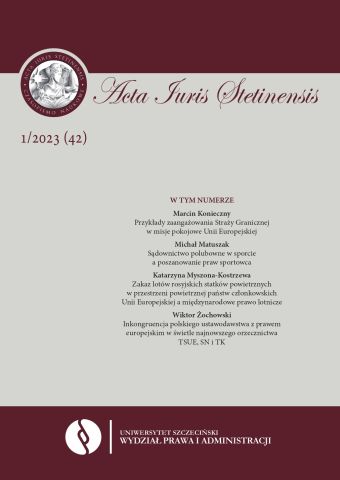







| Authors: |
Joanna
Lipińska

Uniwersytet Łódzki |
| Keywords: | service by a court enforcement officer service of summons service in civil proceedings current place of residence of defendant place of residence of the defendant that is the same as that given in the summons |
| Data publikacji całości: | 2023 |
| Page range: | 21 (63-83) |
| Downloads ?: | 142 |
| 1. | Bodio J., Art. 139(1) Doręczenie pierwszego pisma przez komornika, w: T. Zembrzuski (red.), Kodeks postępowania cywilnego. Koszty sądowe w sprawach cywilnych. Dochodzenie roszczeń w postępowaniu grupowym. Przepisy przejściowe. Komentarz do zmian. T. I, Warszawa 2020. |
| 2. | Borodziuk M., Doręczenie komornicze w praktyce sądowej po zmianach procedury cywilnej dokonanych 7 listopada 2019 roku, „Prokuratura i Prawo” 2021, nr 3. |
| 3. | Jankowski J., Nowelizacja Kodeksu postępowania cywilnego mocą ustawy z 4.7.2019 r. (cz. I – Przepisy ogólne; Właściwość sądu; Skład sądu; Wyłączenie sędziego; Pisma procesowe i Doręczenia; Posiedzenia sądowe; Pozew), „Monitor Prawniczy” 2019, nr 18. |
| 4. | Klonowski M., Kierunki zmian postępowania cywilnego w projekcie Ministra Sprawiedliwości ustawy o zmianie ustawy – Kodeks postępowania cywilnego oraz niektórych innych ustaw z 27.11.2017 r. – podstawowe założenia, przegląd proponowanych rozwiązań oraz ich ocena, „Polski Proces Cywilny” 2018, nr 2. |
| 5. | Markiewicz D., Art. 1391 Doręczanie pisma pozwanemu przez powoda, w: T. Szanciło (red.), Kodeks postępowania cywilnego, Komentarz. Art. 1–50539. Tom I, Warszawa 2019. |
| 6. | Michalska-Marciniak M., Art. 1391 KPC Doręczanie przez powoda, w: A. Marciniak (red.), Kodeks postępowania cywilnego. Tom I. Komentarz. Art. 1–205, Warszawa 2019. |
| 7. | Ojczyk J., Koniec z fikcją doręczeń. Pozew do rąk własnych dostarczy komornik, www.prawo.pl/biznes/nowe-zasady-doreczania-pism-sadowych-procedura-doreczen,495757.html. |
| 8. | Rewelska A., Zobowiązanie do doręczenia pozwu lub innego pisma procesowego wywołującego potrzebę podjęcia obrony praw pozwanego za pośrednictwem komornika – art. 1391 k.p.c., w: M. Białecki, S. Kotas-Turoboyska, F. Manikowski, E. Szczepanowska (red.), Nowelizacja postepowania cywilnego. Wpływ zmian na praktykę sądową, Warszawa 2021. |
| 9. | Rylski P., O nowelizacji Kodeksu postępowania cywilnego ustawą z 4.07.2019 r., „Palestra” 2019, nr 11–12. |
| 10. | Sławicki P., Sławicki P., Doręczenia pism za pośrednictwem komornika sądowego w postępowaniu zabezpieczającym, klauzulowym i egzekucyjnym, „Przegląd Sądowy” 2020, nr 11–12. |
| 11. | Sołtysik S., Doręczenie komornicze (art. 1391 k.p.c.) – próba oceny regulacji ze szczególnym uwzględnieniem wykorzystania przez ustawodawcę konstrukcji doręczenia autonomicznego, w: M. Dziurda, T. Zembrzuski (red.), Praktyka wobec nowelizacji postępowania cywilnego. Konsekwencje zmian, Warszawa 2021. |
| 12. | Tomaszek A., Nowe zasady postępowania po nowelizacji procedury cywilnej, „Monitor Prawniczy” 2019, nr 19. |
| 13. | Uliasz M., Art. 1391 Doręczanie pism pozwanemu przez powoda, w: J. Gołaczyński, D. Szostek (red.), Kodeks postępowania cywilnego. Komentarz do ustawy z dnia 4.7.2019 r. o zmianie ustawy Kodeks postępowania cywilnego oraz niektórych innych ustaw, Warszawa 2019. |
| 14. | Uliasz M., Art. 3a Doręczenie osobiste przez komornika, w: J. Gołaczyński, D. Szostek (red.), Ustawa o komornikach sądowych. Komentarz, Warszawa 2019, Legalis. |
| 15. | Włodkiewicz B., Funkcja ochronna doręczenia na podstawie art. 1391 K.P.C., w: M. Dziura, T. Zembrzuski (red.), Praktyka wobec nowelizacji postępowania cywilnego. Konsekwencje zmian, Warszawa 2021. |
| 16. | Zamojski Ł., Doręczenie pozwanemu pierwszego pisma procesowego wywołującego potrzebę obrony na podstawie art. 139(1) KPC, „Monitor Prawa Handlowego” 2019, nr 3. |